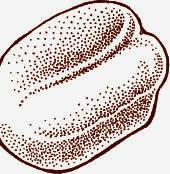Bread Machine (32 page)

 Twenty minutes before baking, preheat the oven to 375°F.
Twenty minutes before baking, preheat the oven to 375°F.
 Place the baking sheet in the center of the oven and bake for 25 to 28 minutes, until golden brown. Remove the rolls from the pan and cool on a rack. Serve warm, or cool to room temperature and reheat.
Place the baking sheet in the center of the oven and bake for 25 to 28 minutes, until golden brown. Remove the rolls from the pan and cool on a rack. Serve warm, or cool to room temperature and reheat.

Brown-and-Serve Dinner Rolls
These brown-and-serve instructions may be used for
Virginia Light Rolls
, as well as
Soft Whole Wheat Dinner Rolls
, or
Squash or Pumpkin Cloverleaf Rolls
.
Mix, rise, and shape dinner rolls as directed in the recipe. Arrange the rolls in two 9-inch round cake pans, in two 9-by-9-inch ungreased disposable aluminum baking pans, or in disposable muffin tins. Let rise until doubled in bulk at room temperature, about 30 minutes.
Preheat the oven to 300°F.
Bake in the center of the oven until the rolls are fully baked, but not browned, 15 to 20 minutes. Remove from the oven and cool completely on a rack in the pan. Place the pan of rolls in a heavy-duty plastic bag, or wrap in plastic wrap and then in a layer of aluminum foil, and refrigerate for up to 3 days or freeze for up to 3 weeks. You can bake half the rolls and eat them while fresh, and freeze the other half for later.
To serve: Let the pan of frozen rolls thaw in the bag at room temperature or in the refrigerator overnight. Preheat the oven to 375°F for 15 minutes. Bake the rolls until golden brown, 10 to 14 minutes. Serve immediately.
EGG BAGELS
Makes 16 bagels
B
agels differ from other yeast breads because after the dough is risen and shaped the bagels are immersed in boiling water to give them their characteristic firm, chewy interior. They are really fun to make. Be easy on yourself with the forming; homemade bagels will never be as evenly shaped as commercial ones, but they taste incredible. While all bagels are not egg bagels, I find the addition of eggs makes for a slightly lighter homemade version; bagel dough tends to be very dense. Split, toast, and serve these bagels with butter and jam or with lox and cream cheese.
1
1
/
2
- OR 2-POUND-LOAF MACHINES
1 cup water
2 large eggs
1
1
/
2
tablespoons vegetable or canola oil
4 cups bread flour
1 tablespoon sugar or malt powder
1 tablespoon gluten
2 teaspoons fine kosher salt
2
1
/
4
teaspoons SAF yeast or 2
3
/
4
teaspoons bread machine yeast
3 to 4 quarts water
2 tablespoons fine kosher salt
1 egg yolk beaten with 2 table spoons water, for glaze
Sesame, poppy, caraway, or fennel seeds, for garnishing
 Place the water, eggs, oil, flour, sugar, gluten, salt, and yeast in the pan according to the order in the manufacturer’s instructions. Program for the Dough cycle or the Bagel cycle; press Start.
Place the water, eggs, oil, flour, sugar, gluten, salt, and yeast in the pan according to the order in the manufacturer’s instructions. Program for the Dough cycle or the Bagel cycle; press Start.
 When the Dough cycle ends, bring the 3 to 4 quarts of water to a rolling boil in a deep stockpot. Turn the dough out onto a lightly floured work surface; the dough will be stiff. Divide the dough into fourths. Divide each quarter into 4 equal portions. Shape each portion of dough into a smooth round, tucking the excess dough underneath. Flatten with your palm. Poke a floured finger through the middle of the ball. Stretch the hole with your fingers to make it about 1 inch in diameter. Spin the dough around your finger to expand the hole; the hole will be quite large as you spin, but will shrink slightly when you stop. Set the bagel aside on the work surface while forming the others. Let the bagels rest on the work surface for 15 minutes; they will need no further rising after this.
When the Dough cycle ends, bring the 3 to 4 quarts of water to a rolling boil in a deep stockpot. Turn the dough out onto a lightly floured work surface; the dough will be stiff. Divide the dough into fourths. Divide each quarter into 4 equal portions. Shape each portion of dough into a smooth round, tucking the excess dough underneath. Flatten with your palm. Poke a floured finger through the middle of the ball. Stretch the hole with your fingers to make it about 1 inch in diameter. Spin the dough around your finger to expand the hole; the hole will be quite large as you spin, but will shrink slightly when you stop. Set the bagel aside on the work surface while forming the others. Let the bagels rest on the work surface for 15 minutes; they will need no further rising after this.
